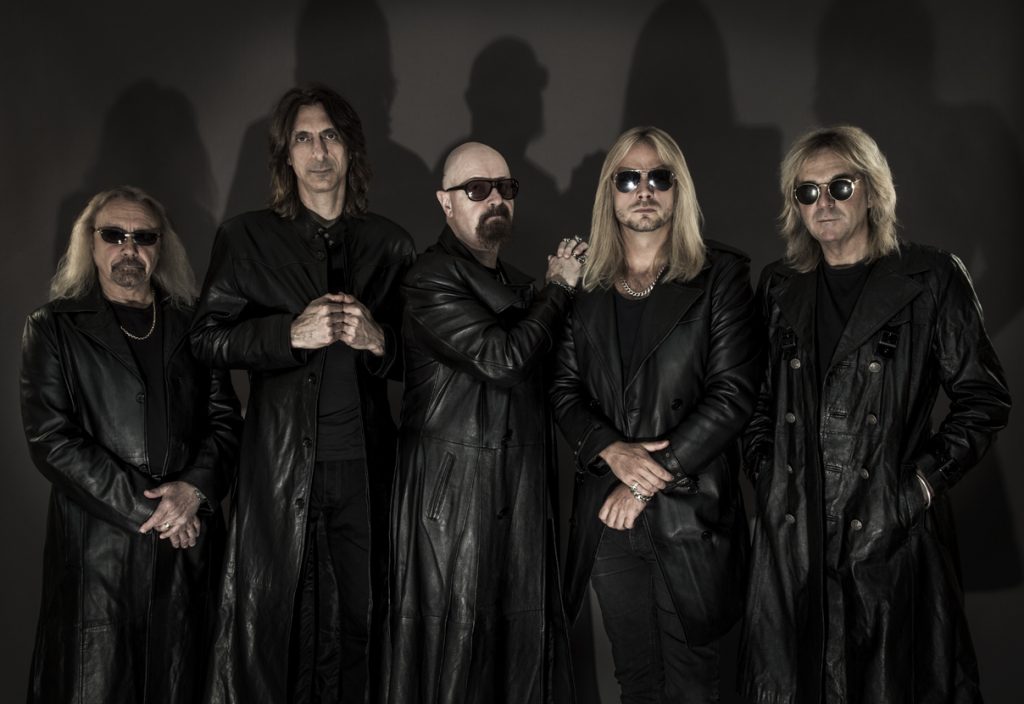Q&A: Judas Priest cofounder Ian Hill on the new tour, resurgence and the future

Judas Priest. Courtesy: Travis Shin.
Even the members of Judas Priest were surprised when, nearly 50 years into the iconic metal rockers’ careers, the band’s 18th album became the highest-debuting in America. Firepower, which Judas Priest released in 2018, debuted at No. 5 on the Billboard 200—and No. 5 or higher in 16 other countries.
“It really did surprise us,” said bassist Ian Hill, who cofounded the band that became Judas Priest in 1969, in a recent call from the band’s home in England. “I mean, the state of album sales, the way they are these days, we weren’t expecting a great deal. Although having said that, it is a great album. I’m glad it did as well as it did. After 50 years, you suddenly get the highest chart entry that you’ve ever had, and it just shows that we’re still relevant after all these years, and still part of the scene.”
Judas Priest was one of the first iconic metal bands to break out of England in the late 1960s and early ‘70s. How iconic? They were the inspiration for the film This is Spinal Tap. Hill, guitarist K.K. Downing, frontman Rob Halford (who joined in 1973 and became one of the first metal rockers to go with the leather and metal studs look), guitarist Glenn Tipton (joined in 1974) and Scott Travis (the band’s eighth drummer, who joined in 1989) set the scene that many others went on to follow. The band proved influential even in more turbulent times, such as when Halford left briefly in the 1990s and was replaced by Tim “Ripper” Owens. That lineup change was the inspiration for 2001 film Rock Star.
More recently, K.K. Downing left the band in 2011 and released an autobiography that detailed past disagreements within the band, and the 71-year-old Tipton has had to step down from live touring after Firepower was completed because a previous diagnosis of Parkinson’s disease was impeding his ability to play his best night in and night out.
Judas Priest replaced Downing with guitarist Richie Faulkner, and Andy Sneap, who produced Firepower, was added to fill in for Tipton—even while Downing has been quoted as saying he would like to return to the band.
Despite the lineup roulette, the band that created classic albums as British Steel, Screaming for Vengeance and Painkiller; and classic rock radio mainstays “Breaking the Law,” “Living After Midnight” and “You’ve Got Another Thing Coming” has been going strong in recent years.
Judas Priest’s 2008 album, Nostradamus, reached No. 11 on the Billboard 200. The band won a Grammy for Best Metal Performance in 2009, received its first nomination for the Rock and Roll Hall of Fame in 2017 and had its highest charting commercial rock radio single in decades with “Lightning Strike” last year.
And the band has no notion of stopping, with musical inspirations always coming, Hill said.
“It’s just something that’s in us, you know?” he said. “If your creative juices are flowing, they are. And if the material’s good that’s coming out, well, we’ll go ahead and we’ll continue to record albums. … We’ve got some good ideas together. And we got a good production team as well, with Andy Sneap and Tom Allom. I assume we’ll be using those guys again. We’ve got some time off for the rest of this year, after the U.S. run. I don’t know what we’ll do next, but we should be back in the studio.”
RIFF: The music industry has changed so much over the last decade. Do you try to play along with what’s happening at the moment, or do you do your own thing and just trust that your fans will find you, no matter what?
Ian Hill: We will do our own thing. We’ve been really lucky, you know. … The fans have loved it as well. And they’ve gone along with it. Like I say, we’ve been very, very lucky in that respect. Obviously, you let the fans know when you’re doing anything, so we’ve got a huge debt of gratitude to pay to those guys, and long may it continue, you know? There’s not a morning I don’t wake up and don’t consider that I’m a lucky person.
Turning toward your upcoming tour, what I’ve read is that you’re going to be playing some new songs that you haven’t played live before, so what’s the scoop? What can fans expect?
It’s going to be the third time we’ve been back to the States, so we thought we better shake the set up a bit. Keep the interest out there. We’ve all learned nine, 10 songs that we didn’t play on the last two legs, so there will be some changes. … Songs that we haven’t played for a long time or fans’ favorites that we haven’t played for a while. And another few new ones from Firepower, so it could be a really fresh set, with this production that’s been changed as well. It’s shaken everything up. So it’ll be a sort of a fresh experience.
Which of either the new ones that you haven’t played before, or the old ones that you haven’t played in a really long time, are you most excited about yourself?
Off the new album, possibly “Necromancer” and “Traitors Gate.” Of the older ones, “The Sentinel,” maybe. … A couple of others as well, maybe “Judas Rising,” “All Guns Blazing” and things like that. Don’t quote me on this because we haven’t decided yet exactly what we’re going to be playing. These are the songs that we’re all learning individually at the moment, [and we’ll get together] a week or so before starting the tour, and then decide which ones we’re going to put in the set.
You’ve been playing with Andy Sneap for a while now. What’s it like having him in the band, and will he be an official member?
That’s pretty much up to Andy. His first calling really these days is as a producer. But he’s always going to be welcome. He’s done a tremendous job so far, stepping in for Glenn. We would’ve been in deep trouble if he hadn’t have been there. He pulled a rabbit out of a hat there by learning so many songs in such a short period of time. He’s done a great job. As time goes on, he’s getting a bit more confident on stage, and what have you. And we’ll go to the end of this run, with him in the States. And then we’ll see where we want to go after that. Whether he wants to carry on with his production career—well, he’s going to do that anyway. But whether he wants to go back to doing it full time, or whether he’s prepared to give that up for a while and be part of Judas Priest; we’ll wait to see. It’s something to be discussed, really. And it will be mutual all the way. We’ll understand if he wants to go back to his production. He’s more than welcome to stay.
What’s the band’s relationship like with K.K. Downing right now? I don’t know if you guys read his book, but it sounds like, if given the chance, he’d love to come back. What are the band’s thoughts on that?
It’s a difficult call. I mean, Richie took over from Ken. He’s done an absolutely tremendous job, he really has. And he’s made Ken’s parts his own now. He’s got his own angle on the lead breaks. Ken’s part’s been taken, and there’s no plans to have Ken back, really. Hey, listen, never say never. But at the moment, we’re going along quite well without Ken, so it could stay like that. I think, at least for the foreseeable future.
What do you think will be the next big trend in metal music, and do you pay any attention to what the young bands are doing these days?
It’s difficult when you’re on the road all the time. You listen to things. Yeah, there’s a few bands coming up, isn’t there? There already are. There’s bands that have come up since we’ve been playing, and I’m sure somebody’ll take over the top spot long after we’ve gone. Halestorm; they’re an up-and-coming band at the moment; they’re doing some great stuff. Alice in Chains have been around a while. … The genre is in good shape, really. There’s a hell of a lot of people playing heavy metal. And there’s no shortage of new acts coming along.
The band officially turns 50 years old this year, so how are you celebrating?
I’m not at the moment. That’ll come next year; we’re planning on a celebratory tour next year. We weren’t actually known as Judas Priest in 1969. Ken Downing, myself and a guy called John Ellis formed in ’69, but we weren’t called Judas Priest, actually, until 1970, so we’ll start celebrating next year.
You’ve been pretty close with Ozzy Osbourne, and you were going to be opening for him before his illness. Have you guys been staying in touch with how he’s doing?
As far as we know, Ozzy’s had another setback apparently. He got quite ill; he had pneumonia and things like that. He’s had a fall, apparently, and his doctors have decided he’s not to do anymore touring this year. I understand he’s trying to reschedule for, I think February next year. But we’ll wait and see there. Let’s hope he does. Our thoughts are obviously with him. We’re all sending him our best wishes, and hoping for the best.
Will Glenn Tipton be involved when you’re back in the studio, working on your next album?
That’s the plan, yeah. In fact I’m sure he’s coming up with ideas, chord sequences, riffs and what have you, as we speak. It’s sad that he can’t get out on the road, but there’s nothing wrong with his brain. And he’s still as creative as he was, so we’ll be waiting to see what he comes up with, and we’ll get to work on it.
Has anybody ever asked you to rank your 18 albums by favorite? Is that something that you think you might be able to do?
Oh, it’s a tough one. Your favorite album is always the new one. It’s fresh, it’s something that you’ve just been working on for a couple of years. So that’s always going to the favorite. Second favorite, I don’t know, probably Defenders of the Faith, I think, is my second favorite album. And it’s hard to say what the least favorite is, because I like them all.
Follow editor Roman Gokhman at Twitter.com/RomiTheWriter.

